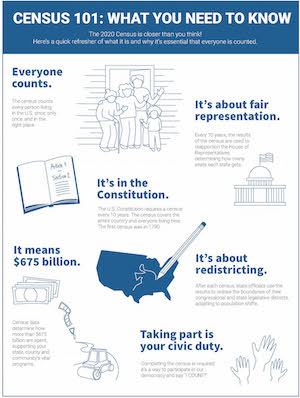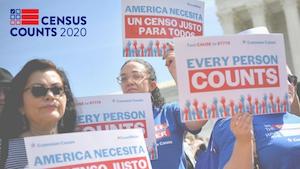Breaking News: [July 21, 2020] Trump signs memo ordering census workers to not count undocumented in the Census:
With No Final Say, Trump Wants To Change Who Counts For Dividing Up Congress’ Seats
* * * * * * *
Article 1, Section 2 of the Constitution mandates that every ten years a count — or census — of the U.S population is taken. Beginning on April 1, 2020, the U.S Census Bureau will again administer this nationwide survey to count every resident in the United States.
This year’s Census will be especially challenging. Immigrant populations have long been among the “hard-to-count” populations for the Census. The attempt to add a “citizenship” question, a new online process, and aggressive, aggressive immigration enforcement raids and other actions contribute to an environment of distrust and intimidation that can negatively impact immigrant household participation.
 To support community organizing to support immigrant inclusion in the Census, we have created a set resources in: NNIRR’s Grassroots Tools for Immigrant Inclusion in Census 2020
To support community organizing to support immigrant inclusion in the Census, we have created a set resources in: NNIRR’s Grassroots Tools for Immigrant Inclusion in Census 2020
In February, NNIRR initiated a sign-on letter (for organizations) and a petition to the Trump Administration demanding that immigration enforcement activities be suspended throughout the Census 2020 process. We gathered over 350 individual signatures and 80 organizations, and this during the beginning of the public health crisis! While conditions have changed and the Census outreach period has been hampered by necessary Shelter-in-Place orders, it is still imperative that we support our communities to participate AND pressure the Administration to halt all immigration enforcement activities to protect safety, access to health care and essential services and economic supports for all during the COVID-19 pandemic.
What is Census 2020?
Data collected from each Census provides current facts and figures about the people, places, and economy of the U.S. Census data can only be used for statistical purposes, and the confidentiality of all individual responses is protected under Title 13 of the United States Code. Thus, the sharing of an individual’s personal Census information with public, state or local governments, law enforcement, and other federal agencies including ICE, is a serious federal crime.
Click here for NNIRR informational flyer about Census 2020.
Click here to to view a Census 2020 timeline prepared by Asian Americans Advancing Justice.
Why the Census is Important:
An accurate Census is essential for democratic processes and supporting communities. Census population data is used to reapportion the House of Representatives — dictating how many seats each state will have for the following ten years and affecting state electoral votes. As a result, geographic shifts in political power within the U.S. are already visible. In the last decades, congressional seats have been lost in the Northeast and Midwest and reapportioned to the western and southern regions of the U.S.
Significantly, Census data is used to allocate more than $675 billion in federal funds each year. An undercount in the Census could severely impact government funding for education, health care, affordable housing, employment and infrastructure in communities that are already under-resourced and marginalized.
 Read about how much federal aid went to states and local governments from various federal agencies and programs for the 2010 fiscal year here.
Read about how much federal aid went to states and local governments from various federal agencies and programs for the 2010 fiscal year here.
Furthermore, communities themselves rely on demographic Census data to identify resident characteristics and needs, and to determine what areas would benefit the most from the building of schools, roads, hospitals, and businesses. Organizers in immigrant communities are particularly mindful of Census data, which provides important information on issues and needs of growing immigrant populations — demonstrating, for example, where concentrations of specific language groups may live, and where there may be needs for more bilingual education and language-sensitive services.
Click here to download the factsheet above.
Immigrant Communities and the Undercount:
Immigrant-based communities are at the top of the list of “Hard-To-Count Populations” (HTC) when it comes to Census participation. New arrivals, lack of familiarity with the Census, language barriers, and lower responses from poor neighborhoods, are all factors that have resulted in an undercount among immigrant communities in the past, and are only exacerbated by an ongoing climate of fear and government distrust.
The President’s constant anti-immigrant rhetoric and even now, a renewed threat of mass arrests and deportations reinforces community-wide concerns about participating in the Census and fear that the data would be used for immigration enforcement purposes — or even that government-employed Census outreach workers may not be trusted. In past Census periods, immigrant rights advocates have pressed the government to suspend immigration enforcement activity prior to and during the Census. Read NNIRR’s 2010 national sign-on letter calling for a suspension of enforcement activity.
In early July, after many months of uncertainty, the Trump Administration officially deserted attempts to include a question about citizenship on the 2020 Census. The Trump Administration’s insistence on the question — the first time it would have been asked since the 1950’s — was yet another attempt to undermine immigrant community participation in civic life. The addition of a citizenship question stirred significant controversy as the question would have intimidated millions of immigrants from filling out the constitutionally mandated survey, resulting in a drastically skewed Census with immediate and long term consequences.
Even though the citizenship question will not be on the 2020 Census, countless immigrant rights and other organizations, including NNIRR, are continuing to work with local Census outreach committees and in supportive coalitions to ensure a fair and inclusive count for Census 2020.
Furthermore, Trump has recently threatened to issue an executive order that requires all U.S government agencies to provide existing federal records in order to compile citizenship data.
Go here to read more about the Citizenship Issue.
Find Key Resources about the Census and the Citizenship Issue here[img_assist|nid=1712|title=|desc=|link=none|align=middle|width=300|height=167]
